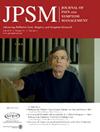Variation in Palliative Care Program Performance for Patients With Metastatic Cancer
IF 3.2
2区 医学
Q2 CLINICAL NEUROLOGY
引用次数: 0
Abstract
Context
While specialist palliative care is associated with improved end-of-life quality metrics for patients with advanced cancer, its effectiveness may differ between hospitals.
Objectives
To examine variation in palliative care program performance on end-of-life care quality metrics.
Methods
Retrospective cohort study of palliative care programs that participated in the National Palliative Care Registry, 2018–2019. Medicare data for patients age ≥65 who died with metastatic cancer were aggregated on a program-level. Variation in program performance on outcomes (use of hospice, hospice enrollment ≥3 days, use of intensive care in the last 30 days of life, and use of chemotherapy in the last 14 days of life) was quantified by risk-standardized outcome rates (RSOR) and adjusted median odds ratios (aMOR).
Results
The cohort comprised 235 palliative care programs who delivered care to 33,015 patients. There was substantial variation in use of hospice (median RSOR 65.6%, interquartile range (IQR) 57.5%–74.3%), hospice enrollment ≥3 days (median RSOR 53.6%, IQR 48.6%–58.2%), and use of intensive care (median RSOR 14.1%, IQR 13.1%–15.3%), but not use of chemotherapy (median RSOR 1.5%, IQR 1.4%–1.5%). Variation was greatest for hospice use (aMOR 1.48 [1.39–1.57]), suggesting that patients at programs with high hospice use would be 48% more likely to use hospice than if they received care at programs with low use.
Conclusion
We found variation in most end-of-life quality metrics for patients with metastatic cancer. Further work is needed to better understand why variations exist and whether such variations reflect a difference in quality of care.
针对转移性癌症患者的姑息治疗项目绩效差异。
背景:尽管专科姑息关怀与晚期癌症患者临终关怀质量指标的改善有关,但其有效性可能因医院而异:研究姑息关怀项目在临终关怀质量指标上的表现差异:对2018-2019年参与国家姑息治疗注册的姑息治疗项目进行回顾性队列研究。对年龄≥65岁、死于转移性癌症的患者的医疗保险数据进行项目层面的汇总。通过风险标准化结果率(RSOR)和调整后的中位几率比(aMOR)对项目在结果(使用临终关怀、临终关怀注册≥3天、生命最后30天使用重症监护以及生命最后14天使用化疗)方面的表现差异进行量化:结果:结果显示,235 个姑息关怀项目为 33015 名患者提供了关怀服务。安宁疗护的使用(中位数RSOR为65.6%,四分位数间距(IQR)为57.5%-74.3%)、安宁疗护入院时间≥3天(中位数RSOR为53.6%,IQR为48.6%-58.2%)和重症监护的使用(中位数RSOR为14.1%,IQR为13.1%-15.3%)差异很大,但化疗的使用(中位数RSOR为1.5%,IQR为1.4%-1.5%)差异不大。使用临终关怀服务的差异最大(aMOR 1.48 [1.39-1.57]),这表明在临终关怀服务使用率高的项目中,患者使用临终关怀服务的可能性比在使用率低的项目中高48%:我们发现大多数转移性癌症患者的临终质量指标都存在差异。要更好地了解差异存在的原因以及这些差异是否反映了护理质量的差异,还需要进一步的工作。
本文章由计算机程序翻译,如有差异,请以英文原文为准。
求助全文
约1分钟内获得全文
求助全文
来源期刊
CiteScore
8.90
自引率
6.40%
发文量
821
审稿时长
26 days
期刊介绍:
The Journal of Pain and Symptom Management is an internationally respected, peer-reviewed journal and serves an interdisciplinary audience of professionals by providing a forum for the publication of the latest clinical research and best practices related to the relief of illness burden among patients afflicted with serious or life-threatening illness.

 求助内容:
求助内容: 应助结果提醒方式:
应助结果提醒方式:


